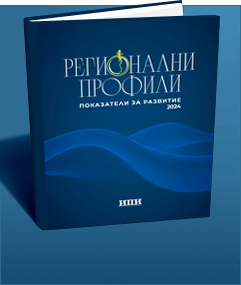Observations on the huge math school entrance score gap by regions
The admissions’ campaign of 8th grade for the next school year is almost ended and now it could be the right moment to represent some observations of this process and its outcomes. The 8th grade admission is a crucial step in student’s education path: choosing the type of school, profile, and profession in the gymnasium, which presuppose the child’s future (both professionally and personally). This choice is strongly dependent on student’s wish (and its parents) to develop in certain segment as well as the results of NEE that the child has achieved after the 7th grade at “Bulgarian language and literature” and “Mathematics”. The school’s classification is performed by score, separately formed for every class as combination of the results from NE and the years’ grade of definite subjects - between 30 and 500 points. This means that for the same profiles, the classifications’ score and the admission could be distinctive in different schools and districts of the country.
To illustrate this differences, we will represent the minimum scores of the second classification for admission to the state mathematics and the nature mathematics schools (MG/PMG)in Bulgaria, in the classes with “Mathematics” profile [1] by regions. The second classification makes it possible to compare the admissions’ score, because of it is mainly performed at the same list of wishes for candidacy for all school placements. The “Mathematics” profile in MG/PMG was chosen due to comparatively straightforward tracking the similar schools [2] with a theoretical close level of preparation, facilitating easy comparison between them.
What do the data show?
- The admission in the MG/PMG - maybe also in others gymnasiums of the country - requires a score, many times differing among separate districts. For example, amidst Pleven and the capital the difference is 3.6 times. Only in four districts of the country the minimum score of “Mathematics” profile exceeds 400 points . The minimum score only in 7 of 25 districts is below 200 points. Two regional administration of education do not provide the information of minimum score from the detached steps of classification - Haskovo and Kurdzhali. In one region - Montana - there are no classes with “Mathematics” profile, despite the city having a nature mathematics gymnasium.
- The profiling in mathematics, in general, is not wished by masses of the students and their parents. Excepting some of gymnasiums in the capital and mathematics schools in Varna, Burgas, and Ruse, where is observed huge competition for admission, in the last mathematics gymnasiums there is an achievable, fairly with low outcomes, admission. Even in Sofia, out of both mathematics schools (Sofia mathematics gymnasium and National nature mathematics gymnasium), the classes with the “Mathematics” profile are not proposed, and their scores are rather mediocre. This offering is a consequence of searching, so we can draw a conclusion that choosing of profile in the field of mathematics science is leaded not by wish of the students to develop and to specialize their own skills, but by the school’s prestige and name. This conclusion is proven by relatively a little number of students, appearing for the profiled matriculation every year in mathematics after graduating secondary school.
- Even out of the “Mathematics” profile, comparatively lower scores in many of provincial schools for analogous classes reveal that "hysteria 7th grade" already is not reality in Bulgaria everywhere. Obviously, the preparation which starts one or two years before appearing at NEE and significant amount of resources separated for private tuition, schools, and additional occupations is unknown for an ever greater part of the students and their families. And this is actually good news.
In conclusion, it is important to note that heavy differences in the admission scores at similar profiles are unavoidably going to have the distinctive quality as the result and the output results. The quality of education, both at the national and regional levels, remains a primary task for the Ministry of Education. An appropriate system of assessment and incentives needs to be developed and implemented with high quality, but it is still under discussion without any concrete steps taken.
[1] Some notes to the data: 1) The first ranking results are presented for Silistra, Dobrich, and Yambol due to no available spots in the second ranking of selected parallels. In Dobrich, scores from the mathematics class at SS 'Stefan Karadzha' were used as there is no 'Mathematics' profile class in the nature mathematics gymnasium. 2) Targovishte has no mathematics schools. The score from the class with the 'Mathematics' profile at 1st SS 'Sveti Sedmochiselnitsi' was utilized, the only one in the district. 3) In Kyustendil district, RAE represents school data, not individual classes. The minimum grade from 'Prof. Emanuil Ivanov' nature mathematics gymnasium, Kyustendil city, was used. 4) No data is available for Haskovo and Kardzhali. 5) In certain areas like Sofia (city) and Stara Zagora, there are two mathematics gymnasiums in each city. The table displays mathematics classes with lower minimum scores.
[2] Tracking “Foreign language” and “Natural Sciences” profiles, for example, is more challenging due to the varying schools that offer them to students.

